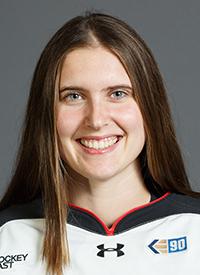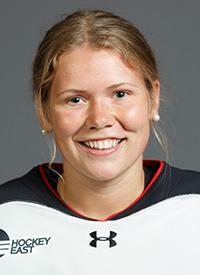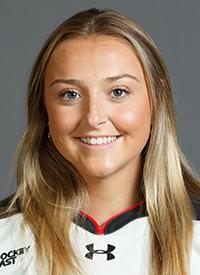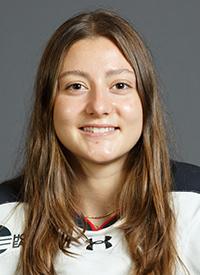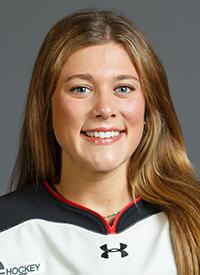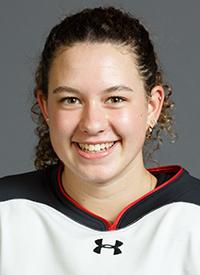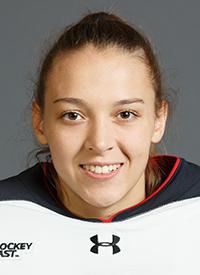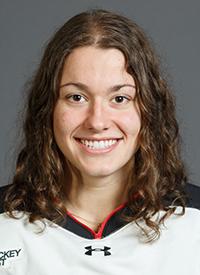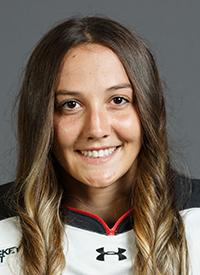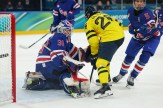‘It prepares us for the real world.’ Northeastern women’s hockey team chases national title with 10 players working full-time as co-ops
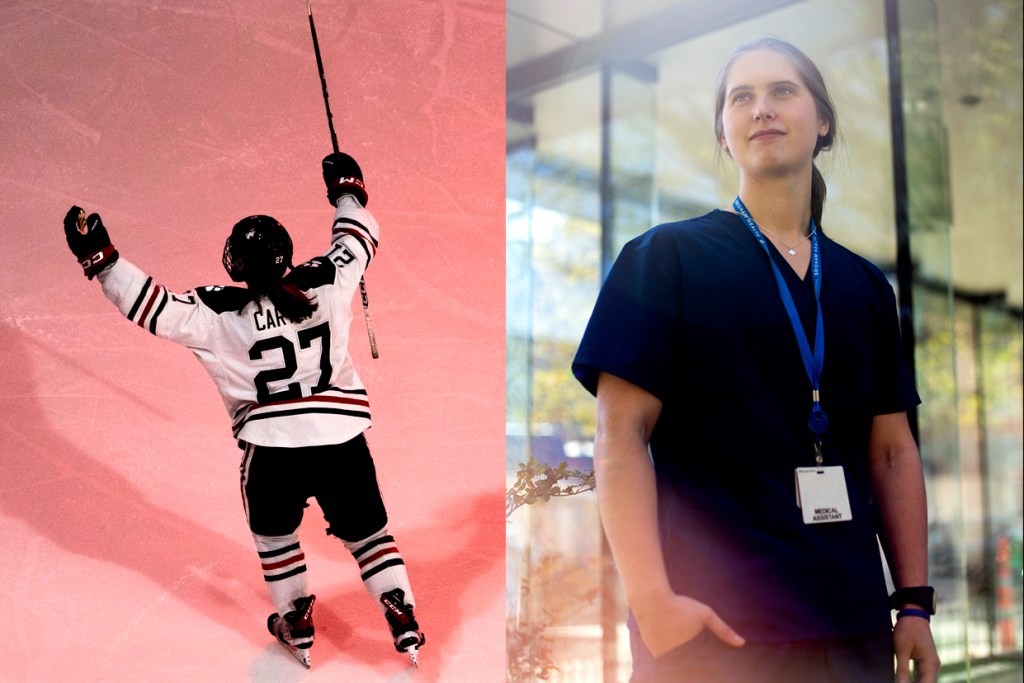
Gwyneth Philips, the top goaltender in NCAA women’s ice hockey, starts her workday at 6:30 a.m. by spending a nurturing half-hour with her dog, Paris. After breakfast and a rush-hour drive from Northeastern’s Boston campus to nearby Chelsea, she works from 8 a.m. to 4 p.m. as a co-op at Harbor House Collective, a small family-owned cannabis company.
By 5 p.m. Philips is back on campus to begin an intensive evening of practice on the ice at Matthews Arena.
Philips is not the only Husky putting in a dozen or more hours per day, plus weekends. In all, 10 players on the Northeastern women’s hockey team are working co-ops—the university’s signature experiential learning program where students integrate semesters of academic study with periods of full-time employment.
Every night since September, Philips and her teammates have been training—practices, weight lifting, film sessions and meetings—in their pursuit of Northeastern’s first NCAA championship in any team sport.
That pursuit could end this weekend.
The fifth-seeded Huskies (34-2-1), winners of 22 straight games since mid-November, face their greatest challenge at 3:30 p.m. Friday against defending national champion and No. 1 seed Ohio State (32-5-2) in a semifinal of the NCAA Frozen Four in Duluth, Minnesota (streaming on ESPN+).
In her first year as starter, Phillips is the runaway national leader in goals-against average (0.81 per game) and save percentage (.961) while balancing hockey with her full-time job.
“It’s so impressive that so many of my teammates are able to work 40 hours a week—and then show up at the ice rink and crush it at practice,” Philips says. “And then performing so well and going on a huge winning streak and going to the Frozen Four.”
The Huskies advanced to their third straight Frozen Four with a 4-1 win Saturday at fourth-seeded Yale. After a rare day off on Sunday, Katy Knoll, the team’s fourth-leading scorer with 34 points (including 18 goals), was back at work Monday and Tuesday as an audit co-op at RMS, a global accounting firm.
With the blessing of her employer, Knoll traveled with the Huskies on Wednesday for what could be a breakthrough weekend in the history of Northeastern athletics.
“Since I have the option to work remotely, I’m definitely going to bring my work stuff [to Duluth],” Knoll says. “Depending on our practice times, maybe I can work in the mornings before breakfast—or anytime I can.”
Even with a national title on the line, Knoll is focused on the future.
“I’m just trying to get as much experience and learn as much as possible,” she says.
Co-op program is a recruiting pitch
At most Division 1 athletic programs around the nation, full-time co-ops would be viewed as a distraction for athletes who are expected to make extraordinary commitments in order to compete at the highest level.
But women’s hockey coach Dave Flint—recognizing there is no lucrative professional hockey league for women in the U.S.—has turned the co-op program into a recruiting pitch that has helped him build a national powerhouse.
Flint used to accommodate his players’ co-op schedules by starting practices for the entire team at 6 a.m. Realizing that the early mornings were wearing out his players, he shifted to night practices several years ago.
“It’s a big part of a degree from Northeastern: Getting that real-world experience, building a resume while you’re in school, and ultimately figuring out is this what they really want to do with the rest of their lives,” says Flint, whose teams have gone 87-9-4 over the past three seasons. “It’s also a big part of my recruiting process in trying to get kids interested in Northeastern. I sell them on co-op. I think it’s so valuable for each one of them.”
More than one-third of the team’s 28 players—including Philips and Knoll—are working full-time jobs in the Boston area this semester:
Time management, organizational skills
Megan Carter’s working experiences have helped her appreciate the enduring value—and values—of her hockey career.
“It’s noticeable when you tell the [job] interviewers, ‘I’ve played on a team my whole life,’” says Carter, who is working her second co-op at Brigham and Women’s Hospital. “I know how to manage my time, I know how to stay organized, I am very reliable, I’ll get done whatever you need me to get done—those kinds of skills and that kind of mentality are things that employers are looking for.”
The players have found employers to be accommodating to their hockey schedules while offering “best of luck” messages and congratulations before and after the big games.
“Most audit interns are pulling 50- to 55-hour weeks, but I’m really strict with my 40-hour weeks because of hockey—and they’re totally understanding of it, which I’m super grateful for,” Knoll says of her employers at RSM.
A senior forward, she hopes to make a career of accounting,
“When I tell them my schedule and that I don’t leave the rink until 8 or 9 p.m.—which is when most other interns would be getting off work—I think they realize I’m still working, it’s just in a different capacity,” Knoll says.
At work Katelyn Knoll uses her given name, but goes by “Katy” while playing hockey—as though she has two separate identities. Her time as an auditor helps take her mind off the pressures of hockey, and the end-of-day practices enable her to decompress after a day at the office.
“But it also can be a very stressful time, especially during playoffs, because I want to put my best foot forward in both areas,” Knoll says. “And that can get a little draining.”
Balancing co-ops, hockey has helped ease strain
The players agree that having so many of them balancing co-ops with hockey has helped ease the strain. When Gwyneth Philips is struggling with a post-practice weightlifting session at 8 p.m., she appreciates the cheers of her fellow co-ops.
“It’s tiring,” acknowledges Philips, who has grown accustomed to late-night suppers. “But I’m pretty fortunate. My roommates (including forward Maureen Murphy) cook dinner for me, which is a huge relief.”
Philips, a senior majoring in industrial engineering, is realizing from her second Northeastern co-op that she might like to make a career in operations with a small company after she’s moved on from hockey.
“I’m on the continuous improvement team, helping connect the different processes to make the whole thing run a little bit more smoothly,” Philips says of her role at the cannabis company. “You’re kind of building from scratch and setting up how the company’s going to run now and in the future based on scheduling, demand, all kinds of stuff. It’s a lot of problem-solving and trial-and-error.”
It’s a big part of a degree from Northeastern: Getting that real-world experience, building a resume while you’re in school, and ultimately figuring out is this what they really want to do with the rest of their lives,” says Flint, whose teams have gone 87-9-4 over the past three seasons. “It’s also a big part of my recruiting process in trying to get kids interested in Northeastern. I sell them on co-op. I think it’s so valuable for each one of them.”
It’s a big part of my recruiting process in trying to get kids interested in Northeastern. I sell them on co-op. I think it’s so valuable for each one of them.
Northeastern University women’s hockey coach Dave Flint
Philips believes the investment in time management with so much at stake is going to help all of the hockey co-ops throughout their professional lives.
“A lot of us run from 6:30 in the morning until after 8 at night with very little break in-between, and I think it prepares us for what the real world is going to look like,” Knoll says. “It says a lot about the university, as well as the companies that the university works with to hire our students—and our athletic staff.
“We are set up to be successful in almost every way possible,” she says. “And then it really falls into our hands to make the most of that opportunity.”
Hockey provides a built-in support system
Carter, winner of the past two NCAA Elite 90 awards as the player with the highest grade-point average at the Frozen Fours, says the co-op experiences have contributed to a family culture that defines this high-aspiring team.
“The nicest thing is that we’re all so supportive of each other,” Carter says. “Say you’re rushing back from class, or rushing back from work to get to practice, everyone is helping you out just to make sure you’re on time or if you need anything.”
Their locker room is the equivalent of a busy working household where everyone is on the go and pitching in to help each other.
“When you have that built-in support system, it just makes everything else so much easier,” says Carter, a Canadian who was drawn to Northeastern in no small part by the co-op program. “Everyone is so driven, because obviously Northeastern is a top academic school and a top athletic school as well. So it takes a lot out of you. But having the family that we’ve built makes everything more enjoyable.”
The most harrowing part of the day may be the commute back to campus because, as Knoll says, “you never want to be the person who’s late, even though the coaches totally understand.”
Flint’s sense of understanding goes only so far, however.
“I have this electric bike. It’s like a moped but it’s got pedals and it goes 30 mph,” Philips says. “I like it. It’s a fun challenge in the city. I was taking that to work but my coach expressed some concern.
“So I hung it up until the season’s over,” the goalie says. “Just to keep him a little less anxious.”
Ian Thomsen is a Northeastern Global News reporter. Email him at i.thomsen@northeastern.edu. Follow him on Twitter @IanatNU.

